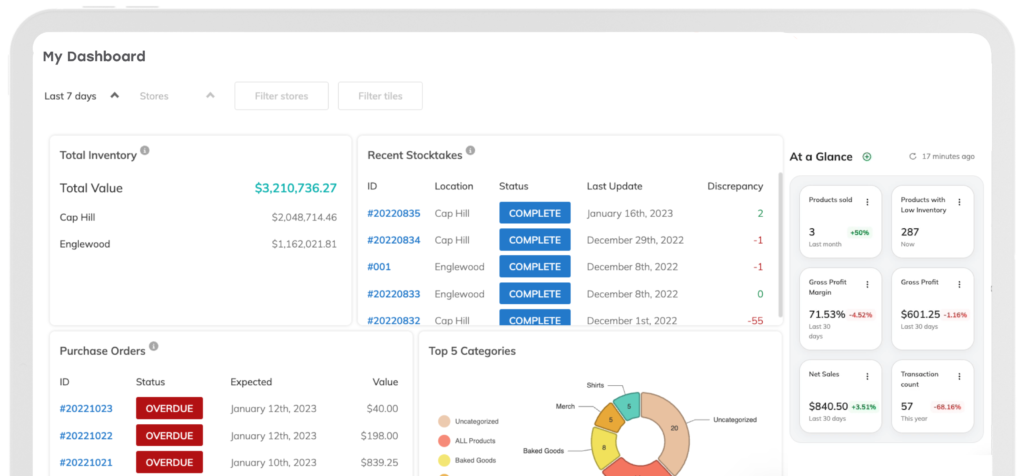
Is Your Wholesale Business Ready For Expansion? 5 Signs To Look For
You’ve invested 110 percent into getting your wholesale business up and running. Now that business is booming, what comes next? Wholesale business expansion is the natural next step on your entrepreneurial journey.
It’s essential to be certain that the timing is right, as expansion is no easy feat. But while it takes a serious commitment to grow your wholesale business, the payoff is well worth it. Read ahead for a guide on how to grow a wholesale business, including signs that you’re ready and tips for growth strategies that really work.
Why You Should Expand Your Wholesale Business
Increase profit through diverse revenue streams
While the logistics of market expansion for wholesalers differ from a typical consumer-facing business, the primary motivation for growth remains the same. Additional revenue streams through multi-channel selling, to name just one example, means diversifying your cash flow.
Successful wholesale expansion offers opportunities to cut operational costs, such as discounts from your suppliers, that help boost your bottom line. Let’s say you run a wholesale chocolate business and want to sell other varieties of candy to retailers. Try a chewy caramel confection — one that uses the same ingredients as the filling in one of your best-selling chocolate treats — and ask your supplier about deals on bulk purchases.
Product line diversification also acts as insurance during market fluctuations that impact your offerings. If a weather event suddenly hits global cocoa markets, you’ve got other sweet treats to offer in the meantime.

Foster new, profitable relationships
Wholesale expansion naturally means broadening your network, from growing your target audience to facilitating connections across your distribution channels. Exploring different markets often requires working with new vendors — and fostering these relationships opens up even more paths for growth.
For instance, food and beverage wholesalers likely need new kitchen supplies to keep up with the increased production demand. A new vendor provides the opportunity to connect with their existing network as well. If you need recommendations, your latest kitchen supply vendor is the right way to start.
Greater control over your success
Being proactive is key to successful wholesale business growth, whether you’re expanding or not. Product diversification puts more control into your hands as a wholesaler. Instead of waiting for a handful of retailers in your existing network to get your products to start selling, expansion means finding markets where your products are already in high demand.
If you run a wholesale dairy business and sales are starting to dry up with grocery store customers, look into offering your products to restaurants. When one of those restaurants puts your line of gorgonzola on the menu as an ingredient in their world-famous mac and cheese, you build your brand — and potentially inspire restaurant patrons to look for your products in their local supermarket.

How To Know You’re Ready To Expand Your Wholesale Business
Your operations are running smoothly
If you want to expand your wholesale business, top-notch operational efficiency is non-negotiable. Your new customers will expect on-time delivery and outstanding customer service from the beginning, so be ready to meet their expectations at scale. Before setting out on a new adventure, you need to have the right infrastructure in place.
For instance, an efficient inventory management system is pivotal to successful scaling. Customer relationship management (CRM) software will also make it much easier to keep track of your growing list of wholesale clients. Get all of your ducks in a row before taking the leap into new territories.
Optimize Your Wholesale Business With Thrive Inventory
Power all the ways you sell with one inventory management platform with built-in wholesale capabilities.
You’re able to cover the cost of expansion
The old adage that you have to spend money to make money holds true when it comes to expanding your wholesale business. Revenue growth requires upfront investments, from buying supplies to amping up your marketing to expanding your warehousing space. If your wholesale business only just recently became profitable, it’s best to wait until you’re confident you have enough capital to support your growth.
That doesn’t mean you shouldn’t start planning for your expansion, though. Draft a budget now. Review past sales data and future forecasts to get a clear picture of how long it will take to save what you need to branch out of your current wholesale market. If you aren’t monitoring them already, establish and track key performance indicators (KPIs) that help you measure how well you’re doing.

Your clients are successfully selling your products
When retailers’ shelves are empty soon after restocking your products, that’s a strong sign it’s time to explore new revenue opportunities. Demand for your existing offerings should be as stable as possible before you invest time and money into new items and markets.
If creating a bigger and better operation sounds appealing, but sales are stagnant with your wholesale customers, it’s worth looking into the reasons why. Supply and demand fluctuations happen, but talking to your current partners is a great way to get valuable insights into the state of the market.
Power Up
Need to strengthen relationships with your retailers? Try these 8 wholesale marketing strategies.
You’ve built brand recognition
Part of building a wholesale customer base that lasts involves nurturing your brand’s reputation. When your pet supply company gains traction because you make chew toys that last for months through all that chewing and tossing, you’re in a good position.
If you want to establish better brand visibility, focus on marketing opportunities that position your wholesale business as an important thought leader. Arrange appearances on podcasts that focus on pet care and increase your social media presence through eye-catching and informative videos. Promotions such as referral programs are also a great way to raise brand visibility while increasing your customer base.
You’ve identified a gap in the market to fill
Sometimes you decide to expand because opportunity comes knocking at your door. If industry trends indicate that a particular demographic or geographic area is suddenly eager to buy what you’re selling, that’s a market worth exploring.
It’s easy to miss these opportunities until it’s too late, so staying on top of trends is key. Conducting regular market research will help you keep track of which areas are flourishing or floundering for wholesalers.

7 Winning Ways To Expand Your Wholesale Business
1. Add to your product line
Developing new items is one of the best strategies for wholesale growth. A growing variety attracts a new audience and gives you the opportunity to increase wholesale sales among your existing customers. A wholesale textile business that adds fleece to its lineup of linen, cotton, and silk should let their clothing retail clients know before it’s time to design their winter line. That way, summer seasonal customers have a chance to turn into year-round clients.
2. Explore direct-to-consumer e-commerce
Whether or not you already have an online store to serve retailers, extending your offerings directly to those who end up using your products is a low-investment, high-reward way to expand.
Before launching your D2C online store, make sure to have a robust e-commerce system ready to host it. Prioritize a seamless user experience when building your digital storefront. Make it easy to find products, add to cart, and checkout. Make sure you also have staff or other systems in place to address customer questions and concerns. Provide outstanding customer service; it’s one of best ways to increase brand loyalty and bring in more referrals.
3. Open a brick-and-mortar storefront
There’s no substitute for experiencing your products in person. A storefront gives newcomers the chance to get to know your items up close. Perhaps you want to add a storefront to your existing wholesale pottery warehouse. Crafting an inviting atmosphere with visually appealing displays is a great strategy for putting your creations directly in the hands of consumers. It also gives retailers an opportunity to see what else you offer when they come by to pick up a wholesale order.
Your brick-and-mortar strategy doesn’t have to compete with your online efforts either. Sales data from one your e-commerce site is a good indicator that a product should make its way to your physical shelves and vice versa. If you’ve got the tools to support both sales channels, a complementary strategy has the potential to invigorate sales across the board. Make sure to prioritize a POS system that integrates with your inventory management software for a smooth transition when you’re ready to launch your new storefront.
Confidently Run A Multi-Channel Business
Manage and optimize your inventory across all the places you sell with one platform.
4. Get creative about the retailers you sell to
Think beyond your industry’s traditional audience when considering other sales channels. Let’s revisit the pottery wholesaler example. Maybe your existing customers are largely home goods stores and local galleries that specialize in pottery. If you just introduced a line of high-quality potters, a plant nursery has the exact customer base you’re seeking. Pay them a visit and ask about a potential partnership. If they run nurseries in a few locations, the payoff could be more lucrative than you first expected.

5. Enlist the help of sales reps
Building strong relationships takes time and effort — and sometimes, it’s worth it to outsource the work. Wholesale sales representatives work specifically with wholesalers to get their products on retailers’ shelves. Partnering with a sales rep who specializes in the wholesale industry gives you access to a vast network of potential connections. Plus, a sales reps’ wealth of expertise helps you tap into valuable market insights. It’s well worth the cost of hiring if your new sales rep introduces your stationery business to a chain of office supply stores with national reach outside of your local market.
Power Up
When Stone’s Beer & Beverage Market was looking to grow their wholesale business, Nick brought on a sales rep who took them from 0 to 150 wholesale accounts in two years. Listen how, on The Power Up.
6. Collaborate with complementary brands
Strong relationships are the lifeblood of wholesale business growth. In addition to promoting your business with retailers and consumers, consider how partnerships with other brands might give you both a leg up. For example, a wholesale skincare line might look into potential collaborations with a spa franchise. Your high-quality products are used in treatments and sold in the gift shop, inspiring customers to keep up the pampering at home.
There are also endless opportunities for promotional campaigns. See if the spa is willing to offer a 20 percent discount to loyal customers on your e-commerce site. You’ll introduce new customers to their services and increase the chance of repeat purchases for both businesses.
7. Consider private labeling your products
Although it means sacrificing some brand visibility, private labels offer a ton of untapped potential for wholesalers. Focus on private labels, retailers who work with third-party manufacturers to create products under their company name, that exhibit a level of quality that meets your typical standards.
Smart Wholesale Expansion Spells Success
When wholesale expansion is the right strategic move, the rewards greatly outweigh the risks. From diversifying product lines to delving into new markets, scaling your wholesale business successfully takes business savvy and a good amount of prep. Once you’ve established a stable, profitable wholesale business equipped with the right infrastructure, it’s time to step outside of your comfort zone and break new ground. If you follow these best practices for wholesalers and invest in the right partnerships, success is right around the corner.
The Newsletter For Small Businesses
Weekly expert insights, industry trends, and inspiring stories designed to help you run your business with confidence.
The Only Inventory System That Actually Helps You Run A Healthy Business
Thousands of customers all over the world use Thrive Inventory to run a healthy business.
Thrive Inventory gives you control over all your inventory, sales channels, and metrics, allowing you to make the right decisions at the right time.
Keep Reading

The Newsletter For Small Businesses
Weekly expert insights, industry trends, and inspiring stories designed to help you run your business with confidence.
Try Thrive Inventory For Free
Add Thrive Inventory to your business and maximize your potential. With powerful and easy-to-use products, it’s time to take control of
your business and see what you can do with Thrive.




